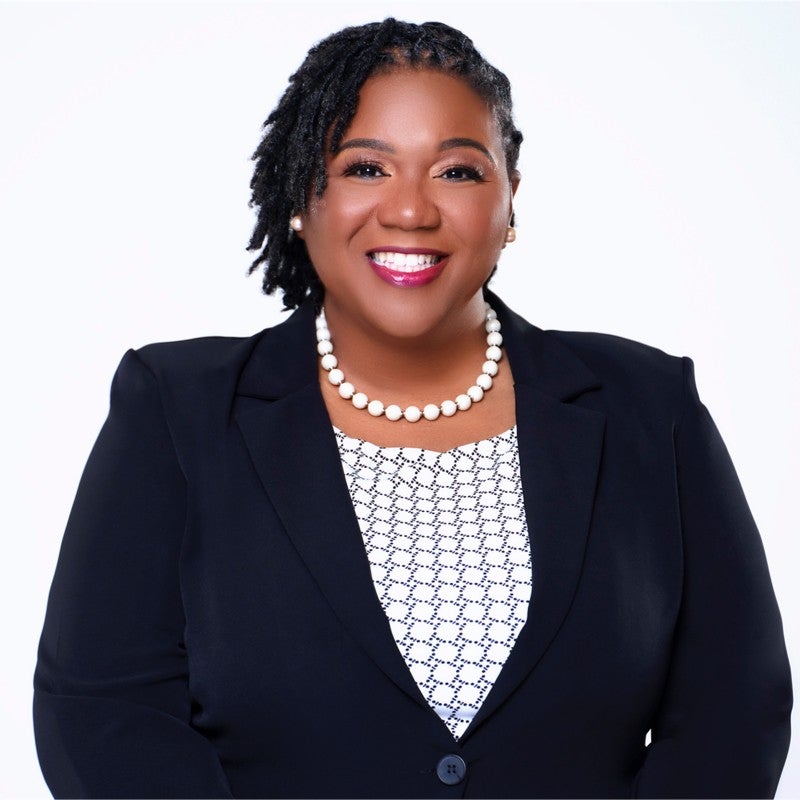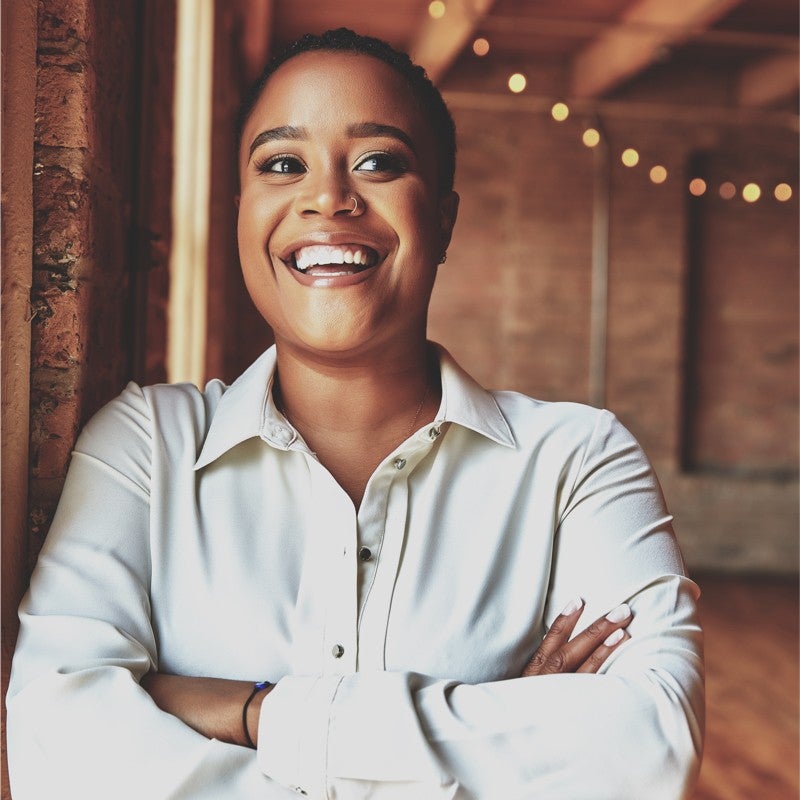
Whitnie Goins, 31, heard God tell her to sit still after facing a devastating breakup with her then-boyfriend in 2018. It wasn’t her first heartbreak, but it hit differently than the others.
“Throughout my life I’ve always run toward something else after a relationship ended,” she told me via Zoom from her beautiful high-rise LA apartment. A few months ago she lived in Chicago, where she’d been just shy of a decade. Before that, a promotion temporarily took her to Minneapolis. Prior to that, she was in Indianapolis for college, a place she’d also been itching to leave after some dalliances there had ended, not to mention her professional pursuits beckoned her to bigger cities. “I have the habit of leaving town after splitting with a dude, not going to lie,” she shared laughingly.

Whitnie doesn’t just relocate post-heartache—she acknowledged during our conversation that she’d developed a habit of picking up something else while healing from relationship woes: professional achievements. She has a degree in business from Butler University and a litany of certifications including a DEI certificate from the prestigious Cornell University. That wasn’t enough though.
“After that last break up, I began looking into graduate schools in other states and started studying for the GMAT to escape the hurt and anger I felt, but that little voice told me to stay put and learn this life lesson.”
Whitnie’s not alone.
Black women have joked on social media about going back to school or pursuing a better job after a breakup to inadvertently make those who hurt them eat their hearts out.
This is what I call a “spite degree” (a term I’d like to believe I coined since I haven’t seen it anywhere else on the web) or the “revenge glow-up,” as it’s been colloquially-dubbed. These are not new notions, or even a phenomenon singular to Black women. After all, Khloe Kardashian created an entire show around the concept, albeit from a more vain standpoint, but the message is still clear—the desire to level up is universal. When it comes to merit-based comeuppances, however, Black women are edging everyone else out.
Black women’s work ethic by the numbers.
A 2020 report from the National Center For Education Statistics shows that Black women are enrolled in college at a higher percentage than any other group including white women, Asian women and white men. Black women have also been obtaining degrees at a consistently high rate for the last ten years as compared to Black men; between 2009 and 2010 Black women accounted for 68 percent of associate’s degrees, 66 percent of bachelor’s degrees, 71 percent of master’s degrees and 65 percent of doctorate degrees awarded to Black students during that time frame, ESSENCE previously reported.
They also have the highest labor force participation rate of all women according to 2021 data from the Department of Labor—meaning a higher share of Black women are either employed or unemployed and looking for work.
Regarding entrepreneurship, Black women were found to be the fastest-growing demographic of entrepreneurs in the nation as well, with them making up 17% of the US’s new business owners as compared to 10% of white women and 15% of white men. As J.P. Morgan points out in its report on the state of racial wealth inequity, the motives for this boom are linked to either producing a source of income or following a dream. In other cases, it could be an attempt to affirm self-worth.
Marla Albertie, m.ed., cpc, aptd can attest to the latter.
Despite working a day job as HR Director for the Mayo Clinic, running a multimedia coaching company, a publishing imprint and non-profit organization for at-risk teens, Marla’s also pursuing a doctorate in industrial & organizational psychology. She made the decision to go back to school after initiating proceedings for her second divorce in 2016.

“I’ve always been a go-getter but after another failed marriage, I took a moment to pause and reassess the way I viewed myself, and if it was mostly through the eyes of my ex, or my own.”
While in the relationship, she shared that her ex wasn’t the most supportive of her ambitious goals and even made her question her own potential. Once she’d made the decision to leave, Marla once again channeled most of her energy into career development.
“I didn’t want to stop for anybody because at the end of the day, I know I’m going to achieve everything I set out to do but I’m not going to lie, the dissolution of the marriage gave me that extra push.”
Seeing the forest for the degrees.
Although admirable, this emotionally-driven action can pose challenges down the road if we’re not careful.
“Ultimately, I believe that allowing certain adversities to serve as motivation can be advantageous in some ways,” said Amari Jackson, ma, lcpc. She is a certified clinical counselor and owns Growing Boundlessly, a Chicago-based holistic wellness firm that frequently counsels high-achieving Black women in pursuit of culturally competent mental health therapy solutions.

“When it comes to a spite degree, you can inadvertently overload yourself with responsibilities in an effort to mask some mental health challenges that are simmering right below the surface. This is what’s called the Sisterella Complex.”
A term coined by Dr. Kumea Shorter-Gooden, its in reference to the tale Cinderella, in which Black women become so consumed with the care of others (e.g. loved ones businesses, schooling etc.) they neglect caring for themselves.
“Sisterella—a form of depression—can emerge when the African American woman subsumes her own needs to those of others and/or when she internalizes negative stereotypes and myths about Black women,” Dr. Shorter-Gooden told The Journal of Pan African Studies in a 2014 interview. She went on to say that typical signs of depression can set in as a result but “sometimes these traditional symptoms are not evident, but are masked by culture-specific manifestations, as in the Stoic Overachiever persona, or the Angry Black Woman persona.”
Either of these personas are well warranted, since empirical data has shown that even though Black women consistently show up academically and entrepreneurially, their tireless efforts still fall short when compared to their counterparts.
For example, despite outpacing other racial and gender groups in entrepreneurship, their businesses are more likely to fail faster due to a lack of adequate funding and resources to sustain them. Regarding the pervasive racial wealth gap, data has shown that well-educated individuals end up in more affluent households. This doesn’t apply to Black women, however, because they’re less likely to be married, a choice that can instantly boost wealth. While single men out-earn single women, married couples had nearly four times the median net worth of single people in 2019.
The Brookings Institute pointed out that white women with an undergraduate degree are almost as likely to be married today as in 1960, but marriage numbers for Black women are steadily decreasing across the educational gamut. They wrote: The differences in rates of marriage may in part be due to a shortage of “marriageable” black men, itself a product of high rates of incarceration and early death. They also point out that Black women are the most race loyal, meaning they are the least likely to marry outside of their race despite dismal intracultural prospects.
To speak plainly, Black women have all the reason in the world to be mad as hell. The societally-inflicted wounds we have are left for us to tend to, usually by ourselves. We give and care and tend and mend and pour into and teach and support oftentimes for naught and this emotional labor/currency has left scores of Black women in physiological debt. So, honestly, the decision to turn our focus to something from which we can actually receive a tangible return on our investment—education—makes perfect sense. Let me be clear, I know pain doesn’t always dictate our drive. But sometimes it does and that’s worth unpacking. For a large number of us, the balm for our scars comes in the form of achievement. But, still, we have to be careful of band-aid solutions.
“It doesn’t have to be this way,” Amari said reassuringly after I asked how we, as ambitious Black women, can find a happy medium. “I suggest really sitting with yourself and asking is this degree or accomplishment something I actually want? Where is the fuel for wanting to do this coming from? Is there some other form of lack that’s causing it? If the answers aren’t clear, it’s likely you need to press pause and re-evaluate that next step.”
I posed the same question about finding a happy medium to Whitnie. After a long sigh, she smiled and said, “I think that looks like giving yourself permission to sit with you, and draw peace from the accomplishments that are already there. And if you’re really quiet, you’ll probably hear something say you’re more than enough.”